As you know, fast (DC) charging stations have increased significantly in the last two years, both in our country and globally. Especially along the Istanbul-Izmir Highway, these stations, which are rapidly spreading and slowly replacing AC stations, raise the question: Does charging your vehicle at these stations negatively impact battery health? Here’s what you need to know…
DC charging is not really harmful!
As you may know, there are many recommendations for preserving the battery life of electric vehicles. One of the most commonly advised practices is charging the battery up to 80% and avoiding 100% charging, as this is believed to be the best method for maintaining battery health. However, another widespread belief is that DC fast charging could harm the battery in the long run and result in reduced range. But is this really true?

The range problem of electric vehicles stands out as the biggest issue for car owners. The long charging times and the fact that charging stations are still less common compared to gas stations make this issue even more prominent. Moreover, when you charge your battery only up to 80%, you lose about one-fifth of the range stated by the manufacturer.
When factors like air conditioning and ambient temperature come into play, the range promised by the manufacturer drops significantly. In this regard, users tend to prefer DC stations over home-based AC charging stations. So, does DC fast charging really shorten battery life?
What is DC fast charging?
The electricity used in homes is generally transmitted as alternating current (AC). However, electric vehicles operate on direct current (DC). When AC chargers are plugged into your vehicle, they convert the electricity to DC before delivering it to the battery. On the other hand, DC fast charging stations perform this conversion beforehand and deliver the electricity directly to the battery. This significantly speeds up the charging process.

Impact on battery health?
The excess heat generated during DC fast charging can alter the chemical structure of the battery, potentially leading to cell degradation over time. However, recent studies show that frequent use of DC fast charging does not damage the battery as much as once thought.
A recent study conducted on the Tesla Model 3 revealed no significant differences in battery lifespan between vehicles that frequently used DC charging and those that didn’t.
In the study, Tesla vehicles that spent more than 70% of their time at DC fast charging stations were compared with those that used this type of charging less than 30% of the time. It was observed that the rates of wear and tear in the batteries were similar.
In summary, the difference between using DC and AC stations isn’t significant enough to drastically shorten the battery’s lifespan. Still, experts recommend that users who don’t have time constraints and can install an AC station at home should do so.
What are your thoughts on this? Feel free to share them in the comments.













